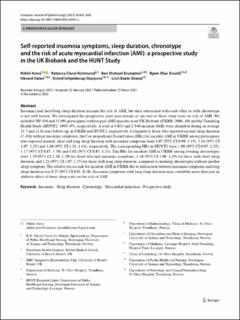Self-reported insomnia symptoms, sleep duration, chronotype and the risk of acute myocardial infarction (AMI): a prospective study in the UK Biobank and the HUNT Study
Arora, Nikhil; Richmond, Rebecca C.; Brumpton, Ben Michael; Åsvold, Bjørn Olav; Dalen, Håvard; Skarpsno, Eivind Schjelderup; Strand, Linn B
Peer reviewed, Journal article
Published version
Permanent lenke
https://hdl.handle.net/11250/3114981Utgivelsesdato
2023Metadata
Vis full innførselSamlinger
Originalversjon
European Journal of Epidemiology (EJE). 2023, 38 643-656. 10.1007/s10654-023-00981-xSammendrag
Insomnia and short/long sleep duration increase the risk of AMI, but their interaction with each other or with chronotype is not well known. We investigated the prospective joint associations of any two of these sleep traits on risk of AMI. We included 302 456 and 31 091 participants without past AMI episodes from UK Biobank (UKBB; 2006–10) and the Trøndelag Health Study (HUNT2; 1995–97), respectively. A total of 6 833 and 2 540 incident AMIs were identified during an average 11.7 and 21.0 years follow-up, in UKBB and HUNT2, respectively. Compared to those who reported normal sleep duration (7–8 h) without insomnia symptoms, the Cox proportional hazard ratios (HRs) for incident AMI in UKBB among participants who reported normal, short and long sleep duration with insomnia symptoms were 1.07 (95% CI 0.99, 1.15), 1.16 (95% CI 1.07, 1.25) and 1.40 (95% CI 1.21, 1.63), respectively. The corresponding HRs in HUNT2 were 1.09 (95% CI 0.95, 1.25), 1.17 (95% CI 0.87, 1.58) and 1.02 (95% CI 0.85, 1.23). The HRs for incident AMI in UKBB among evening chronotypes were 1.19 (95% CI 1.10, 1.29) for those who had insomnia symptoms, 1.18 (95% CI 1.08, 1.29) for those with short sleep duration, and 1.21 (95% CI 1.07, 1.37) for those with long sleep duration, compared to morning chronotypes without another sleep symptom. The relative excess risk for incident AMI in UKBB due to interaction between insomnia symptoms and long sleep duration was 0.25 (95% CI 0.01, 0.48). Insomnia symptoms with long sleep duration may contribute more than just an additive effect of these sleep traits on the risk of AMI.

